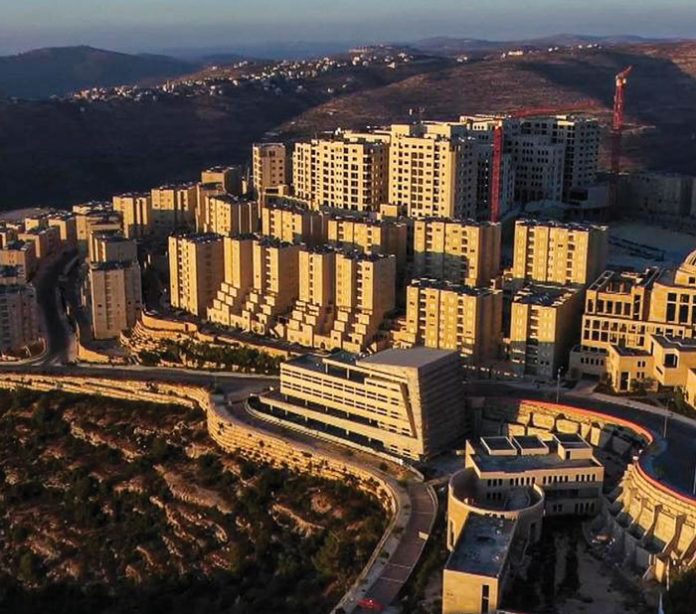The view from the summit of the yishuv of Ateret is intoxicating; the slopes of the Hills of Binyamin are covered in green vegetation, cloaked in a pastoral silence. It would be easy to close your eyes and imagine that you’re in a small village in the middle of Europe—if not for the large Palestinian flag waving defiantly on the other side of the road, which serves as a reminder that you’re at the heart of the bloody conflict between Israel and the Palestinians.
On the ridge opposite Ateret you can see the buildings of Rawabi, an innovative Palestinian city that was built deep in Palestinian territory by a Qatari businessman who wanted to create a well-developed infrastructure for Palestinian life in a future Palestinian state. But the city is a ghost town—out of thousands of houses and apartments only a few hundred are occupied.
The Palestinian Authority opposes the city. The official reason is that the city imposes a modern way of life upon the devoutly religious Palestinian residents. The unofficial reason, however, is that this city has the power to make the lives of its residents too comfortable, which would destroy the narrative of a conquered and oppressed people. Although the city is barely functioning at the moment, it has the potential to be a threat to the nearby Israeli yishuv very soon.
According to Trump’s peace plan, Israel will soon be allowed to extend its sovereignty over Ateret and make it officially Israeli, but the head of the local regional council, Yisrael Gantz, vehemently opposes such a move. The natural surprise at such a position is answered immediately when he begins to explain the dangers lurking within the peace plan, whose announcement was met by rejoicing in Israel. According to the plan, this yishuv will become an enclave. This means, the territory itself will be Israeli, but all of the surrounding territory, including the access roads, will be under the control of the PA. “They’ve promised us free passage,” Gantz tells Ami, “but it’s going to end up being just like Kfar Netzarim,” a former Israeli yishuv in the heart of the Gaza Strip that was uprooted as part of the Disengagement. “In order to enter the village you had to be accompanied by tanks and helicopters. Furthermore, if the entire surrounding territory will belong to the Palestinians, it’s going to mean that this yishuv will not be able to expand at all.”
Gantz says that the Americans don’t understand the second problem; they suggest solving it by building large apartment buildings in order to expand the yishuv without needing more land. However, he says, there are a few problems with that. First, it would mean having to destroy existing buildings in order to find the space for such large buildings. Second, in the Israeli bureaucracy, it takes years until you can get approval to modify building plans. Third, it’s unrealistic to build a city of skyscrapers in the heart of an area that is soon going to turn into a hornets’ nest.
Price of Annexation: A conversation with Yisrael Gantz of the yesha Council
By Chaim Friedlander
To read more, subscribe to Ami





















